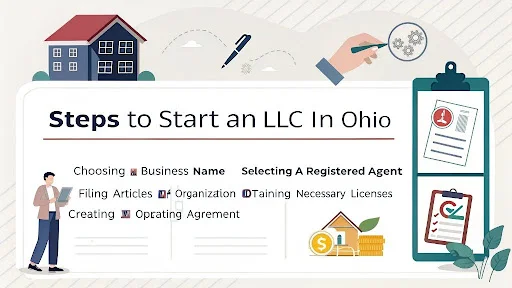Starting a Limited Liability Company in Ohio is a smart choice for entrepreneurs seeking liability protection and a flexible business structure. An LLC separates personal assets from business liabilities, which makes it one of the most popular options for small and medium-sized businesses. Before you can officially launch your LLC in Ohio, it is essential to understand all the requirements and steps involved. Having complete knowledge will save time and prevent unnecessary mistakes that could delay your business operations.
Ohio provides a straightforward process for forming an LLC, but you must carefully meet all legal and administrative requirements. Many new business owners often wonder how much is an LLC in Ohio, as the total cost depends on various steps and fees. This includes selecting a unique business name, appointing a statutory agent, filing the necessary paperwork, and meeting any state-specific obligations. Each of these steps has its own guidelines and timelines. By thoroughly preparing for the process, you can ensure that your LLC is established correctly and remains in good standing with state authorities.
Choosing a name for your LLC in Ohio
The first step in starting an LLC in Ohio is selecting a unique and legally compliant business name. The name must clearly distinguish your business from others already registered with the Ohio Secretary of State. Conducting a name availability search is critical because names that are too similar to existing businesses will be rejected. This can be done online using the Ohio business search tool.
Your LLC name must also include an indicator such as Limited Liability Company or the abbreviation LLC or L.L.C. It cannot include words that imply association with a government agency or restricted industries unless special approval is obtained. If you are not ready to file your LLC immediately, you can reserve the chosen name for up to 180 days by filing a name reservation request and paying the required fee. This reservation ensures that another business cannot register the same name while you complete the remaining steps.
Appointing a statutory agent for your LLC
Every LLC in Ohio must designate a statutory agent, also known as a registered agent. This person or entity is responsible for receiving legal documents and official communications on behalf of your company. The statutory agent must have a physical address in Ohio and be available during normal business hours to accept service of process and state correspondence.
You can act as your own statutory agent if you meet the requirements, or you may choose to hire a professional registered agent service. Many business owners opt for a professional service to ensure privacy and to avoid the inconvenience of being available during all working hours. Using a professional service can cost between 100 and 300 dollars annually, but it offers peace of mind and ensures that no important legal notices are missed.
Filing Articles of Organization with the Ohio Secretary of State
The official formation of your LLC occurs when you file Articles of Organization with the Ohio Secretary of State. This document contains essential information such as your business name, address, the name of the statutory agent, and whether the LLC will be managed by members or managers. The filing fee for the Articles of Organization is 99 dollars, and it can be submitted online or by mail.

Filing online is the fastest method, as it typically takes three to seven business days for the application to be processed. If you file by mail, the process can take up to 10 business days. It is important to complete the form accurately to avoid delays. Once approved, you will receive a stamped copy of the Articles of Organization, which serves as proof that your LLC is legally recognized by the state of Ohio.
Creating an operating agreement for your LLC
Although Ohio does not legally require an operating agreement, it is highly recommended for all LLCs. An operating agreement is a legal document that outlines the internal structure of your company, including the roles and responsibilities of members, how profits and losses will be distributed, and procedures for resolving disputes.
Having an operating agreement in place protects your limited liability status by showing that the LLC is a separate legal entity from its owners. It also prevents misunderstandings between members by clearly defining each person’s rights and obligations. While you can draft this document yourself, hiring a lawyer to create a customized agreement can cost between 200 and 1,000 dollars, depending on the complexity of your business.
Obtaining an Employer Identification Number from the IRS
Most LLCs need to obtain an Employer Identification Number, also known as an EIN, from the Internal Revenue Service. This nine-digit number is used for tax purposes and is necessary if you plan to hire employees, open a business bank account, or file certain federal tax forms. Even single-member LLCs benefit from having an EIN because it helps separate business and personal finances.
The good news is that obtaining an EIN is free and can be done quickly online through the IRS website. If you prefer, you can also apply by fax or mail, though these methods take longer to process. Once issued, your EIN becomes a permanent identifier for your LLC, even if the company later changes its name or address.
Understanding tax obligations for your Ohio LLC
Taxation is an important factor when starting an LLC in Ohio. By default, LLCs are treated as pass-through entities for federal tax purposes, meaning profits and losses flow through to the members, who report them on their personal tax returns. However, you can choose to be taxed as an S corporation or C corporation if it provides financial benefits.
At the state level, Ohio imposes the Commercial Activity Tax on businesses with gross receipts of 150,000 dollars or more annually. This tax is based on total revenue rather than profit and must be filed quarterly or annually, depending on the size of your business. LLC members must also pay personal income taxes on their share of the profits, as well as any applicable municipal income taxes if they live or work in a city that imposes them.
Registering for state and local licenses and permits
Depending on your industry and location, you may need to obtain business licenses or permits before starting operations. Ohio does not have a general statewide business license, but many industries such as health care, construction, and food service require specialized permits.
Local governments may also have their own licensing requirements. You should check with the city or county where your LLC will operate to determine what is required. Fees for licenses and permits vary widely, ranging from 25 dollars to several hundred dollars annually. Failing to secure the proper licenses can result in fines or the suspension of your business activities, so it is important to research these requirements thoroughly.
Opening a business bank account for your LLC
Once your LLC is officially formed, you should open a separate business bank account. This step is critical for maintaining the legal separation between your personal and business finances, which protects your limited liability status. Most banks require a copy of your Articles of Organization and your EIN to open the account.

A dedicated business account makes it easier to track income and expenses, simplifies tax preparation, and builds credibility with customers and vendors. Some banks may also offer additional services tailored to small businesses, such as credit lines or merchant accounts. It is a good idea to compare banking options to find the best fit for your LLC’s needs.
Complying with ongoing reporting and tax requirements
While Ohio does not require LLCs to file annual reports, it is still important to maintain compliance with state regulations. This includes keeping your statutory agent information up to date, paying the Commercial Activity Tax if applicable, and renewing any business licenses or permits as required.
Failure to stay compliant can result in penalties or even the administrative dissolution of your LLC. Setting reminders for filing deadlines and maintaining accurate records can help you avoid these issues. Working with an accountant or business advisor can also ensure that you remain in good standing and avoid costly mistakes.
Considering professional services for LLC formation
Although you can start an LLC in Ohio on your own, many business owners choose to work with professional services. These companies handle the preparation and filing of your Articles of Organization, provide statutory agent services, and may offer additional support such as EIN registration or operating agreement templates.
Using a professional service can save time and reduce the risk of errors, especially if you are unfamiliar with the legal requirements. Fees for these services vary, typically ranging from 50 to 300 dollars in addition to state filing fees. While this represents an added cost, it can provide peace of mind that your LLC is formed correctly and on time.
Final steps to launch your LLC successfully
After completing all the necessary legal and administrative steps, you are ready to officially launch your LLC. This may include setting up accounting systems, hiring employees, securing office space, or launching marketing campaigns. The work you do at this stage will set the tone for your business’s success.

Taking the time to properly form your LLC and meet all the requirements will protect your personal assets and provide a solid foundation for growth. Whether you choose to handle the process yourself or work with professionals, understanding what you need to start an LLC in Ohio will ensure that your business is built on a strong legal and financial footing.


